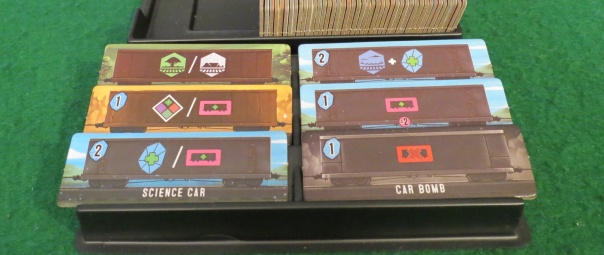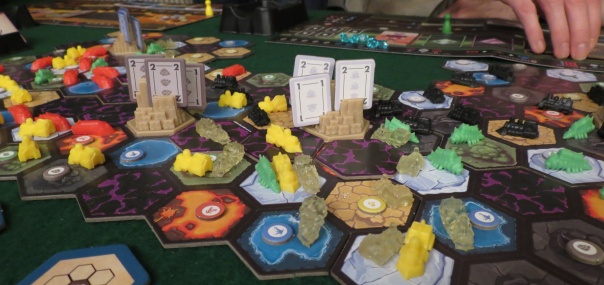Indines Gauge
Last time we saw Trey Chambers around these parts, he was setting a high bar for himself with Argent: The Consortium. Set in Brad Talton’s World of Indines, a universe so overflowing with magic as to make the perfect excuse for bodybuilders, angels, machines, machine assassins, and inter-dimensional huntresses to slug each other in the nose, Argent made its name by giving the worker placement genre a good shaking. Like Talton’s BattleCON before it, Argent wasn’t merely packed to the gills with stuff. It was packed with inventive stuff. In stark contrast to the genre’s more placid entries, here was a world where a site-occupying worker might be removed to the infirmary by a fireball. Provided they weren’t immune to fireballs. Or their employer didn’t cast a counter-spell. Or the threat of mutually assured fireballs didn’t cow their aggressor into backing down.
Now Chambers is back with Empyreal: Spells & Steam, again set in Indines, and again stuffed with magic. Only this time, Chambers has his sights set on trains. Is Empyreal as disruptive of railway gauges and snowball deliveries as Argent was of higher education? More importantly, are there choo-choo fireballs? Let’s take a look.

Racing to make connections.
The first thing I can’t help but notice about Empyreal has nothing to do with the game itself and everything to do with the modularity of its board. After playing a half-dozen titles set in Indines, there’s a particular geography, entirely contained within my head, that’s at odds with the scattershot landscape arrayed on the table. Which of these boards represents the undead realm of Gesselheim, and which the planestalking Kingdom of Jeffries? Are those the city-states of Relecour along the eastern reach, and does that mean Argent is in dire need of what I initially assumed was coal, but which the rulebook informs me is “vital silver”? Or has somebody taken apart the world of Indines, shaken it like a handful of dice, and scattered it across bedrock to resemble continental Catan?
No matter. My discombobulation is momentary. And despite the garish fragmentation of this fantasy landscape, there’s a certain legibility to the whole thing. Each space holds a corresponding resource, and each city proudly and visibly declares which of those resources it most desires. You’re to connect cities with goods. To pick up and deliver, sort of, although its similarities to other games in that vein are limited. Still, even in a place this alien, the goal is familiar.

By the end of the game, you’ll have specialists, spellcars, and, most importantly, points from deliveries.
In fact, one of Empyreal’s biggest surprises is that the whole thing is shot through with that same pared-down sensibility. There’s a notable exception we’ll talk about later, but from its very first moments the game feels like it was designed to put the basics front and center. Contrasted against Argent, which was such a mishmash of actions big and small that they could grow a little fuzzy around the edges, Empyreal comes across as restrained. There are only two actions, and one of those is basically a rest stop, in which you refresh some characters, recharge your mana, and gain a spellcar as a bonus.
The other action is bigger in scope, but still remains a bite-sized morsel compared to those turns in Argent where you rewound time, stepped into an alternate dimension, and still somehow made it to class before the bell. Here the action is focused on your line, a horizontal sequence of spellcars. Your conductor begins at the far left and gradually moves to the right, stepping once for free and farther if you’re willing to expend some mana. Upon stopping, your conductor activates the spellcars in his column. Once again the first is free, while the second and third demand increasing amounts of mana. Most spellcars place trains on the map. Usually this is tied to a particular terrain — say, desert or mountain or lava — but others grant additional mana, swap tracks, hop past your opponents, destroy the environment, teleport beyond your network’s physical limitations, or pretty much anything else Chambers figured he could cram into his game about magical trains. A few turns later your conductor reaches the end of the line, where you’re allowed to make a delivery to any city adjacent to your network using any resources you’re squatting atop, and then gain some permanent bonus that will undoubtedly bend the rules like saltwater taffy. Then it’s back to the beginning to ride the line all over again.
By my reckoning, the ups and downs of Empyreal revolve around a few main points. The tricky thing is that none of them slot easily into a simple positive or negative.
First of all, it isn’t uncommon for many of Empyreal’s turns to feel, if you’ll pardon me this one sin, on rails. Your conductor trundles forward, lets you place a train onto one of a few terrain types, and you pick whichever spot inches your network closer to your desired destination. Of course, this isn’t as straightforward as it sometimes seems. For one thing, you’re free to spend mana to leapfrog along your line, letting you bypass spots that aren’t immediately useful. More importantly, you’re the one responsible for the what each of those turns ultimately looks like.
Played carefully, this is where Empyreal springs to life. There are specialists to manage, whether captains and engineers who provide benefits only once before they need a break, station masters with minor ongoing perks, or surveyors with single-use powers that can reshape the game if triggered at the right moment. And then there are your spellcars, letting you do multiple things in a single turn. The trick is that these individual turns matter less than how you’ve arranged them in advance. The proper set of spellcars and specialists, balanced against your income and expenditure of mana, can result in transformative and disruptive moves. While these moves can seem foreordained, since you’re limited to the spellcars at that point on your line, you’re the one fored the ordaining. In that sense it’s strangely approximate to programmed movement, albeit a system that permits a great deal of flexibility once you execute your plans. This keeps individual turns clipping along even at higher player counts, especially if you’re cool with everyone picking their specialists and spellcars while the next player goes about their turn.
So far, so good. Even better, the abilities are a solid mix of workhorse and lively, with plenty that spread your rails far and wide, but also a respectable selection of nasty tricks for foiling the plans of rival companies. These never attain the same zany disruptiveness as those found in Argent, which is both appropriate to the game’s emphasis on long-term planning and a slight disappointment. You will never, for instance, irradiate an opponent’s entire railway or flip an entire board to its opposite side. But the occasional bombed spellcar, swapped track, or stolen resource? Absolutely.
The hitch, however, is entirely symbolic. Argent had a tendency for wordiness, with cards displaying both iconography and text. Here, all that clutter has been stripped away, leaving only the icons. But while most are easily parsed, quite a few appear only occasionally and require the rulebook to decipher. Expect to pass it around. Worse, expect this problem to dog the heels of your playtime. At times, we had a stack of three people waiting to claim specialists because they needed the rules to clarify all those abilities. More than once, we circled back to somebody’s next turn before they were done choosing a spellcar. For a game that’s usually so quick on the uptake, these pile-ups are unfortunate hiccups.
I’ve spent so many words on pacing because Empyreal is ultimately a race. There are loads of resource tokens, but they’re quickly consumed by companies making deliveries. Doubly so if they’re located near cities or along efficient routes. Moreover, delivering a pile of resources might fulfill a demand tile, worth bonus points. This is also how the game concludes. Fulfill enough of these demands and you can even bring the game to a finish before your rivals are anywhere near your score.
It’s hard to overstate the effect this has on Empyreal. You’re engine-building with literal engines and balancing your mana spreadsheets and trying to scoop up matching sets of resources. And you’re doing all this stuff on a timer set by opponents who are chasing the same resources and flinging spells at you. Early on, your network is small enough that it’s often desirable to hit as many spots on your line as possible. By the late game this procedure is inverted, with companies hopping across their entire line in two or three turns, burning mana like crazy and minimizing how often they’re forced to take breaks, all because everyone is desperately trying to claim particular resources and demands before anybody else.
The whole thing hurtles along at breakneck speed, with all the advantages and provisos that entails. At its best, Empyreal is a hearty mess of half-busted lines and semi-coherent networks, broken apart and stitched back together, mana running on fumes and spells cranked to the nines. At its worst, some jerk pieces together a broken combo and screeches the game to a halt before anyone else’s company is up and running. Oh well. At least it didn’t consume an entire evening.
That’s the peculiar thing about Empyreal — it’s hard for me to worry too much about its shortcomings. It isn’t nearly as gleefully iconoclastic as Argent, but neither is it required to be. Instead, it’s a fast-paced commingling of network building and silly disruption, of engine-building and engine building, of velocity and the periodic clang that threatens to derail the entire enterprise yet, by the grace of whatever deity the inhabits of Indines whisper their prayers to, settles with a whine back onto the tracks. I often joke about not appreciating train games. Preposterous games like Empyreal, on the other hand? Oh yes. It’s impossible for me to do otherwise.
(If what I’m doing at Space-Biff! is valuable to you in some way, please consider dropping by my Patreon campaign or Ko-fi.)
A complimentary copy was provided.
Posted on February 21, 2020, in Board Game and tagged Board Games, Empyreal: Spells & Steam, Level 99 Games, The Fruits of Kickstarter. Bookmark the permalink. 2 Comments.





Pingback: Review: Empyreal: Spells & Steam:: Indines Gauge (a Space-Biff! review) – Indie Games Only
Pingback: Best Week 2020! Some Time Away! | SPACE-BIFF!